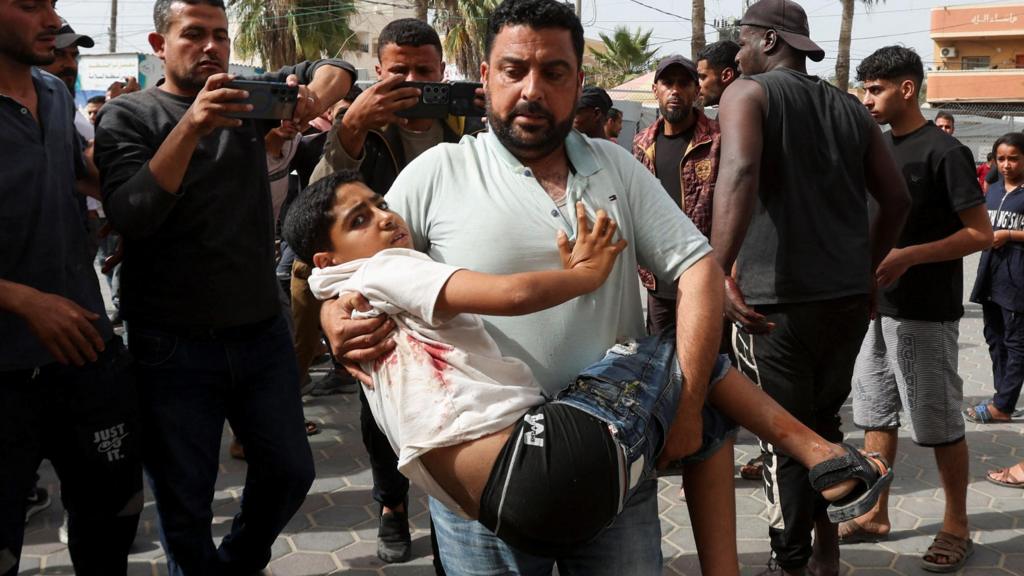Following renewed negotiations on Saturday, Hamas has proposed a revised Gaza ceasefire agreement, offering the release of additional hostages. This proposal emerged hours after Israel launched a significant military offensive, codenamed “Operation Gideon’s Chariots,” in the Gaza Strip.
According to a Palestinian official speaking to the BBC, Hamas has agreed to release nine hostages in exchange for a 60-day truce and the release of Palestinian prisoners by Israel. The proposed deal also includes the daily entry of 400 aid trucks and the evacuation of medical patients from Gaza.
Conversely, Israel demands proof of life and comprehensive details regarding all remaining hostages. Mediated by Qatar and the US in Doha, these ceasefire talks commenced Saturday afternoon local time.
While Israel has yet to publicly respond, prior statements indicated that they would not withdraw troops or commit to ending hostilities. The BBC understands the Hamas proposal does not include these elements.
Saturday’s intensified offensive follows the deadliest wave of strikes in Gaza in months, resulting in at least 300 deaths since Thursday, including casualties in hospitals and refugee camps. The overall death toll since the resumption of Israeli strikes on March 18th, following a two-month ceasefire, stands in the thousands.
The humanitarian situation in Gaza, already dire, has significantly worsened due to a 10-week Israeli blockade restricting the flow of food and essential aid. Earlier this month, Israeli Prime Minister Benjamin Netanyahu pledged a major military escalation aiming to occupy and control parts of Gaza, displace its population, and ultimately “destroy” Hamas.
Reporting from within Gaza, journalist Ghada Al Qurd described widespread airstrikes, shelling, drone attacks, and gunfire, characterizing the situation as “terrifying and horrible.” She highlighted food scarcity and rising costs, forcing her family to survive on a single meal a day, echoing UN officials’ accusations of Israel using food as a weapon.
Aid agencies warn of a looming famine among Gaza’s 2.1 million residents, with reports and images depicting malnourished children. While US President Donald Trump acknowledged widespread starvation in Gaza, the Israeli government continues to deny these claims.
Victoria Rose, a British reconstructive surgeon at Nasser Hospital in Khan Younis, described exhausted medical staff suffering significant weight loss and treating severely malnourished children with extensive injuries and impaired healing capacities.
On May 5th, Prime Minister Netanyahu announced plans for a large-scale ground operation into Gaza, contingent upon the completion of President Trump’s Middle East visit. Following Trump’s departure on Friday, residents in northern and central Gaza were ordered to evacuate, a near-impossible task given the extensive displacement already caused by the conflict.
The IDF reported striking over 150 targets within 24 hours and vowed continued operations until Hamas is neutralized and all hostages are released. Saturday’s strikes targeted various locations across Gaza, including Beit Lahiya, Jabalia refugee camp, Khan Younis, and key infrastructure.
Thousands of Israeli troops are poised to enter Gaza in the coming days, accompanied by tanks already deployed at the border. The escalating offensive has drawn condemnation from the UN and several European leaders.
UNRWA Commissioner-General Philippe Lazzarini expressed outrage, questioning the continued loss of Palestinian lives due to bombardment, hunger, and lack of medical care. He criticized the normalization of atrocities, highlighting global inaction. The UN Secretary-General, along with Spanish and Italian leaders, called for an immediate and permanent ceasefire, while Germany voiced concerns about the worsening humanitarian crisis and the fate of hostages.
Israel’s military campaign, launched in response to Hamas’ October 7th cross-border attack (resulting in approximately 1,200 deaths and 251 hostages), has led to at least 53,000 deaths in Gaza according to the Hamas-run health ministry, including over 3,000 since March. Hamas currently holds 58 hostages.
Analysis of global responses to the Gaza blockade.
Accounts from Gaza during the 10-week aid blockade.
Details of the largest ground assault on northern Gaza since March.
Report on Israeli strikes causing significant casualties in Gaza.
Student’s condemnation of US involvement in the Gaza conflict.

